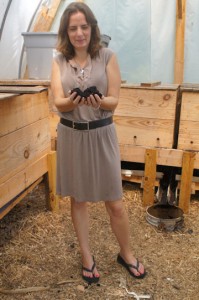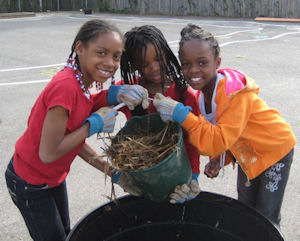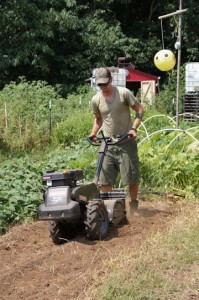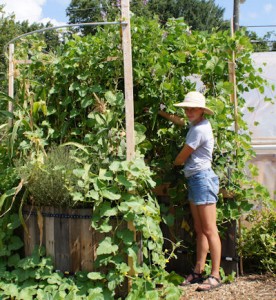About Bacon’s Rebellion
Bacon's Rebellion is Virginia's leading independent portal for news, opinions and analysis about state, regional and local public policy. Read more about us here.
Oasis in the Food Desert
Tricycle Gardens wants to bring healthy local food to Richmond's inner city. It's a tall order changing ingrained dietary habits. Engaging people to grow their own food may be the key.

by James A. Bacon
Bringing healthy fruits and vegetables to Richmond’s “food desert” is the easy part of the job at Tricycle Gardens. The nonprofit environmental group grew 40,000 pounds of fresh, organic produce on its ½-acre urban farm last year – basil and sage; berries and melons; beans and squash – and distributed most of it locally through local farmers markets and food banks.
Getting people to actually eat the food is a bit trickier. Not everyone has acquired a taste for okra and zucchini. Indeed, urban culture has largely expunged fresh food from the menu in favor of fast and processed foods. “Eating patterns and habits have formed over many years,” says Sally G. Schwitters, Tricycle’s executive director. “It’s a transformational change to get someone to see the benefits of eating kale as opposed to potato chips.”
That’s why Tricycle Gardens is much more than an urban farm. The social enterprise also engages in community outreach and education: teaching city dwellers how to grow tomatoes and cucumbers in their own back yards, building distribution networks for their organic produce, and even throwing cooking classes to show people what they can do with exotic fruits and veggies not normally found in a McDonald’s happy meal.
As Richmond’s leading urban farming enterprise, Tricycle Gardens is a key player in Central Virginia’s locally grown food movement. Proliferating organic farms, natural food stores, farm-to-home distributors and artisan producers of specialties from breads to veggie burgers make a culinary cornucopia available to serious foodies. The movement is gaining momentum as people make the link between poor nutrition and chronic diseases like obesity and diabetes. But locally grown foods have inherent limitations. Because they tend to be expensive, they appeal mainly to the affluent. Poor people typically aren’t willing to shell out the shekels for expensive and unfamiliar fare, no matter how healthy it is.
 Ewww, worms! Sally Schwitters holds a handful of worm-wriggling compost, the secret to Tricycle Farms' high yield.
Ewww, worms! Sally Schwitters holds a handful of worm-wriggling compost, the secret to Tricycle Farms' high yield.
Tricycle Gardens’ mission is to close the socio-economic gap. First, change popular tastes by creating a tighter bond between people and the food they eat. “If you plant a broccoli seed, and watch it grow, and clip off a piece in the garden, it’s a different experience” from buying it in the store, says Schwitters, a former California resident who, with her husband, has been involved with sustainable farming for many years. “It creates a deeper love for the food.”
Second, change the economics by demonstrating how to raise fruits and vegetables in home and community gardens. If fresh produce is unavailable in so-called food deserts or simply too expensive for the poor to buy, people can start home gardens. Declares Schwitters: “Be part of the economic revolution of growing your own food.”
Cultural revolution
A few generations ago, a majority of Virginians made their living on a farm. Eating what they grew, they developed a taste for a wide range of fruits and vegetables. Their culinary traditions centered around the foods they knew. Much of that cultural knowledge was lost, however, when people moved to the city. Fare that was familiar to the grandparents’ generation became alien and strange-tasting to the younger generation. Despite repeated warnings from government and media to eat nutritious, balanced meals, people gravitated toward salt- and sugar-saturated packaged foods that were convenient and tasted good.

According to U.S. Department of Agriculture data, roughly 5% of Virginia' population live in food deserts, defined in urban areas as lower-income census tracts where a substantial number of residents live more than a mile from a grocery store. The Richmond region has 19 such census tracts.
Tricycle Gardens has taken on the challenge of re-introducing vegetables to an inner-city population with no taste for them by forging partnerships with other community groups. The Church Hill-based organization has worked with neighborhood groups in eastern Richmond and in Chesterfield County to create “learning gardens” where children can participate in planting, tending and harvesting the food.
 Children are more likely to eat their veggies when they have a hand in raising them. (Photo credit: Tricycle Gardens)
Children are more likely to eat their veggies when they have a hand in raising them. (Photo credit: Tricycle Gardens)
One partner, the Neighborhood Resource Center in Fulton Hill, provides a range of community services such as a pre-school, after-school care, computer literacy classes and job support. Operating out of an old post office building, the center set up an urban garden, consisting of cinderblock planters filled with composted soil, in the parking lot. The garden grows figs, peaches, berries, broccoli, corn and a wide variety of other vegetables.
In a weekly gardening class, young children pitch in to do whatever the garden needs to have done, whether it’s planting, weeding, watering or harvesting. The Center carries the food connection into the kitchen, where kids take cooking classes.
“Staff members are excited about food and eating,” says food program director Blue Clements. “That transfers to the kids -- ‘Oh, gosh, the figs are ripe, try a bite!’ The culture that’s been created here around food and eating is one of positivity. We have respect for everyone’s preferences. We give kids space to try things and have reactions to them.”
Plenty of kids decide they love vegetables. Just a few days ago, Clements watched as children gulped down a tomato as if it were an apple. They even like broccoli. “We have to put a limit on the number of servings because the first kids [through the line] would eat it all.”
Tricycle Gardens connects to adults through a variety of workshops on such topics as composting, building sub-irrigated planters, planting seeds, cooking home-grown crops and preservation techniques. The enterprise also shares best practices and technical knowledge with other groups establishing community gardens.
With assistance from Tricycle Gardens, the 31st Street Baptist Church in Church Hill has established three community gardens to provision the church nutrition center, feed the homeless and sell produce in the farmer’s market. Like the Neighborhood Resource Center, the church mobilizes young people to help cultivate vegetables and herbs in the church's 16 raised beds.
The youth academy summer program took trips to Tricycle Gardens to learn about urban farming, says Linda Marshall, a certified master gardener who runs the church gardens. She’s also picked up some tips from the nonprofit, such as how to use straw to retain moisture and how to put down wood chips to make the garden surface more uniform. “We’re trying different things that we’ve learned by visiting and having conversations with them.”
Economic revolution
 Because urban farming is so highly labor intensive, profits are elusive.
Because urban farming is so highly labor intensive, profits are elusive.
The challenge for the locally grown food movement is competing against industrial agriculture. American agribusiness, the most efficient in the world, dominates the food scene because it exploits the latest technology and enjoys huge economies of scale – vast fields of land, giant combines, pesticides and fertilizers – that allow it to produce food far cheaper than small farmers can. Tomatoes shipped from California and Mexico may not taste as good as a home-grown Hanover, and customers may miss making a connection with a farmer whose name and face they recognize, but the price of food is a greater consideration for most lower-income Americans.
Tricycle Gardens operates five community gardens as well as Richmond's largest urban farm, which has a full-time farmer. Schwitters hopes to make the farm in the Manchester neighborhood financially self-supporting, covering the cost of land, labor and supplies. It helps that organic fruit, herbs and veggies command a premium price in the local grocery marketplace. The enterprise is building a distribution network through Relay Foods, a Charlottesville-based distributor, as well as farmer’s markets and local restaurants.
In an ideal world, Schwitters might find a way to make urban farming so profitable than inner-city entrepreneurs would start setting them up in every vacant lot. But that’s not in the cards any time soon. The nonprofit is leasing its farm property from a benefactor for $1 a year, and the pay scale for its farmer is, well... let's just say he's not in it for the money. Moreover, charging top dollar for its produce is not part of Tricycle Gardens’ mission. The purpose of the organization is to make healthy food accessible to lower-income Richmonders. “It’s a balancing act,” she says.
 Claire Hitchens, a visiting intern from Shalom Farm, shows the bounty from a keyhole garden.
Claire Hitchens, a visiting intern from Shalom Farm, shows the bounty from a keyhole garden.
The most promising strategy appears to be teaching people to grow their own. The demonstration site at the Tricycle Garden headquarters shows a variety of planters made of wood, cinderblock and even heavy plastic bins that have been converted to pocket gardens. One set-up known as a key-hole garden – a round planter roughly 10 feet in diameter with a missing wedge, the keyhole, where the gardener can reach into the middle – is bursting with flowering profusion of squash vines, cornstalks, and herbs – more than a family could ever eat.
The biggest payoff, though, comes from the satisfaction that comes from being self-sufficient and from the spiritual, zen-like connection with nature, says Schwitters. Urban farming is about more than saving money, and more even than eating healthy foods. “Everyone I know who’s involved with it is in love with it. It becomes a lifelong passion.”
This article was written under a sponsorship of Bon Secours Virginia Health System.

